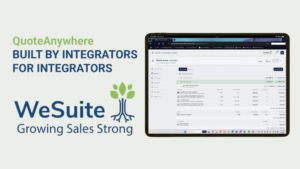Tips and Tricks for Using Commissions to Build A Successful Security Salesforce - Part 2
In our last post, we shared how our work with clients to automate commission calculations often leads to more philosophical questions about how to structure commissions to best their motivate employees. In fact, some common practices can have the complete opposite of their intended effect, actually de-incentivizing employees to exceed their quotas. If you haven’t read Part I read that then continue here for part II!

By Tracy Larson
In our last post, I began sharing how our work with clients to automate commission calculations often leads to more philosophical questions about how to structure commissions to best their motivate employees. In fact, some common practices can have the complete opposite of their intended effect, actually de-incentivizing employees to exceed their quotas. If you haven’t read Part I, click here. Here’s Part II of this important topic.
Commissions for Inside versus Outside Salespeople
If your company sells large commercial projects, with a long lead times and plenty of on-going customer support during and after the sale, you probably rely on a sales team structure that pairs a field rep with an in-house sales partner. How should their commissions differ?
Inside sales personnel, whose role is to support the outside reps and sell smaller, one-off sales, are compensated more by their base salary and a smaller commission per sale. This is consistent with the theory presented in our last post, where research showed that base salary and commissions should be relative to how much control an employee has over the sales outcome. If bringing in new business is the responsibility of the outside sales person, he should be directly rewarded for those efforts. On the flip side, an inside salespeople shouldn’t be unfairly penalized because her outside partner isn’t closing business. But a small commission for inside sales encourages a supportive dynamic between the two, making the inside person more supportive of the outside partner’s needs. It keeps them working together with aligned goals.
Commission Structures Should Mirror Priorities
Often, it makes good sense to incentivize sales and sales goals differently, depending on how important each are to your organization’s growth plans. Goals for revenue growth are separate from goals for profitability. Commissions should reflect that. And you may have in mind specific objectives regarding the growth of new customer accounts, existing accounts, and the sale of particular products or services.
The key is not to introduce complexities into your commission plan that require difficult calculations or too high a level of review, as this can take everyone’s focus off the real goal – which is selling. But you do want to differentiate between specific objectives, and make sure that members of your sales team don’t just stick to their comfort zone, earning commissions from the types of sales that are easiest for them. The simplest way to do this is to keep the commission structure consistent, but to pay more for the reaching the more important sales goals.
Bonuses are another way to help make sure your sales team prioritizes certain stretch goals, and to make working toward them worth the extra effort. They are separate from commissions and are a great way to incentive other team members who directly impact accounts but are not salespeople. Make sure to clearly define what is required and, if the bonus will be awarded to a team, make sure all involved understand the need to work together toward their common goal. If everyone has skin in the game, peer pressure can help motivate employees who might not otherwise go above and beyond.
The Advantages of Using Software to Manage Commissions
Sales software can be extremely helpful in calculating and managing commission, maintaining transparency with employees, and providing data to see what’s working and what’s not.
At the most basic level, software automates commission calculations, even when they’re complex and based on a number of different factors. Whichever software company you’re working with, you should expect to work with them closely to set up calculations that perfectly reflect your organization’s plan.
Depending on the software you use, employees may be able to see the commissions associated with a sale in real time, as they prepare quotes. Knowing exactly how much a sale is worth to them, and how much more it could be worth if they can expand on it – for example, by adding a maintenance contract or increasing the margin on labor – is a great motivator. It can also help ensure they don’t sell below a certain profitability threshold, because they can see how doing so will affect the earning mark they want to hit.
Because calculations are automated, employees can trust that they are being compensated fairly for their work. Debates between salespeople and their managers, as to whether they were paid correctly, are eliminated. Another, related capability is that sales software creates an automated audit trail that documents all the steps a salesperson takes throughout the sales process. This works to their advantage, providing proof positive that they followed all the processes necessary – such as obtaining management approvals – to earn commission on a sale.
And finally, sales software provides a wealth of relevant data that can be used for reporting and analysis, without having to gather and crunch numbers from individuals or manually created spreadsheets provided by sales managers. Commission totals, best sales, market success, most productive lead sources, quickest lead-to-close sales are all there, year after year. This makes it easy for management to develop data-driven growth strategies, define associated sales goals, and align commissions structures that get the salesforce onboard, eager to execute.
In Summary
You want your sales team to knock it out of the park? Then give them a reason to do so! But commissions aren’t just about getting the most from your employees. It’s also about recruiting and keeping them. Any successful security sales organization must offer a fair and effective commission plan in order to attract and retain top talent. Top performers must be lucratively rewarded for their contributions to your company’s success, and new employees and average performers benefit from compensation that keeps them motivated and focused on improvement. And, the priorities of your salespeople must mirror those of your organization. There is no single “right” plan, but if you develop a package that follows many of the points we’ve presented here, you’re on your way! And, don’t forget, the right sales software can make all of this a whole lot easier!
We’d Like to Know!
Are you using software to manage your commission? We’d love to hear about the benefits it’s delivering to your organization. Please share!
Recent Posts

WeSuite Expands Its QuoteAnywhere to a Full-Featured Stand-Alone Sales Platform
WeSuite, a manufacturer of award-winning sales management software for security technology sales and service providers, is excited to announce the expansion of its web-based sales software, QuoteAnywhere, to a full-featured, stand-alone, lead-to-close sales platform.

WeSuite President Tracy Larson Inducted into Security Sales & Integrations Industry Hall of Fame
WeSuite, a manufacturer of award-winning sales management software for security technology sales and service providers, announced today that Tracy Larson, WeSuite President and Co-Founder, has been inducted into the Security Sales & Integration’s Industry Hall of Fame.

Are You Getting the Most Out of Your CRM? Start by Asking these 5 Simple Questions
Your sales pipeline is your lifeline. It tells you where your deals stand, where your time should go, and how close you are to hitting your number. And your CRM? It’s the tool that keeps your pipeline in check.

Is There a Secret to Closing Security Sales Faster? Here Are Seven!
Pushy, high-pressure sales tactics turn off buyers – we’ve all been there! Fortunately, you can increase your on-the-spot close ratio by being buyer and solution oriented with sales automation software like QuoteAnywhere from WeSuite to support your sales efforts.
